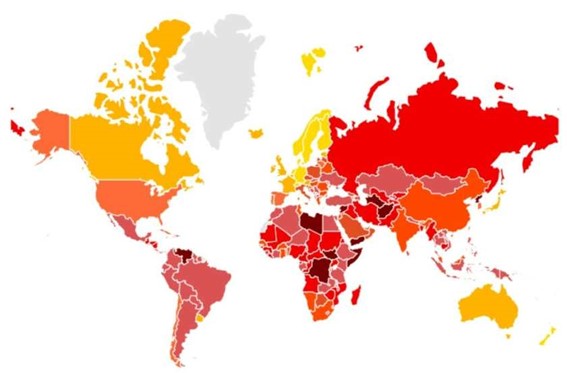The Transparency International is a non-profit anti-corruption organization headquartered on Berlin that operates internationally. Its purpose is to combat corruption and criminal activities related to corrupt acts.
Last Tuesday, January 25, 2022, Transparency International published the 2021 corruption perceptions index (CPI), the results of which can be seen in the world map above, in which countries with less corruption are in yellow and more corrupt countries are in dark red. The CPI considers 180 countries and has been published annually since 1995.
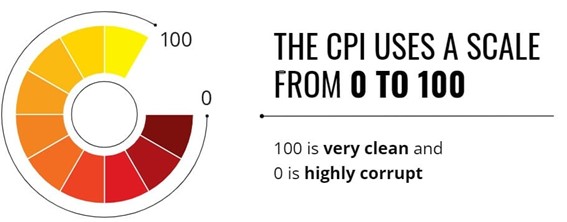
Indeed, the CPI considers the perception of experts and executives – rather than the general public – of the public sectors from 180 countries (currently). The index is elaborated by analyzing 13 different data sources, the production of which is not influenced or manipulated by Transparency International. Data produced by the World Bank and by the World Economic Forum is taken into account, as well as data prepared by risk analysis companies and by companies that play an advocacy role for public policies, producing knowledge on political, economic, or scientific topics. Transparency International standardizes the scores, as their metrics may differ from country to country. The standardization ranges from 0 to 100, and the calculation is carried out for each of country.
This year, Transparency International signals its concern regarding the Covid-19 pandemic, which has been used by some countries as an excuse to restrict basic freedoms, greatly impacting checks and balances, and the worldwide increase in attacks against human rights and democracy.
The ranking of all countries can be seen in the images below:
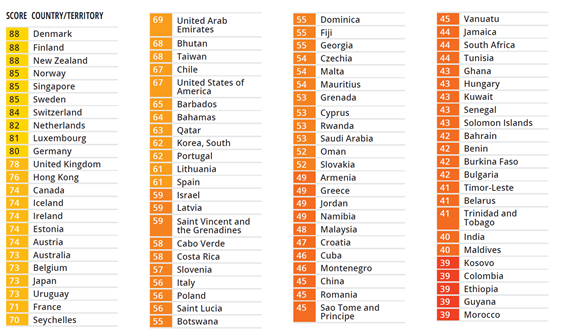
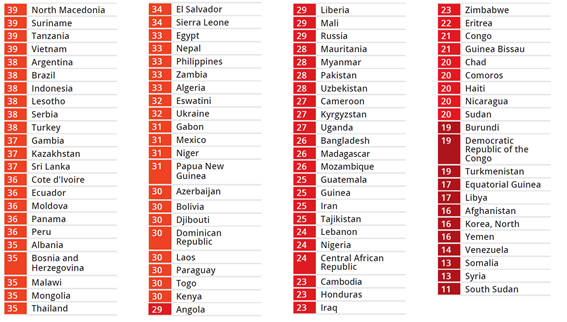
A remarkably interesting way of analyzing these indexes is comparing them with previous years. The results are not good: it was observed that the corruption control stagnated or worsened in 86% of the countries analyzed in the last decade. This information can be seen in the table prepared by Transparency International below:
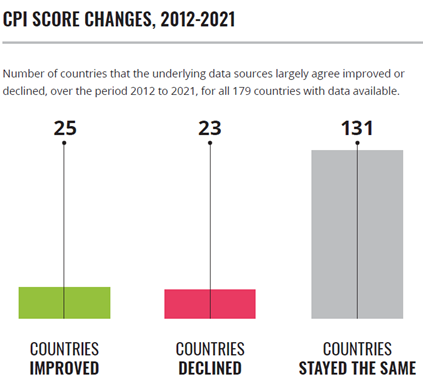
While Denmark, Finland, and New Zealand (with 88 points), followed by Norway, Singapore, Sweden, Switzerland, Netherlands, Luxembourg, and Germany make up the top 10 positions in the ranking, South Sudan (11 points), Syria, and Somalia (13 points), followed by Venezuela, Yemen, North Korea, Afghanistan, Libya, Equatorial Guinea, and Turkmenistan, wrap up the bottom.
In South America, Uruguay continues to lead the ranking with 73 points, followed closely by Chile, with 67 points… and that’s it! Other South American countries, including Brazil, are doing very poorly, with scores ranging from 30 to 39, except for Venezuela, which has only 14 points.
The mediocre performance of the South American continent can be seen by taking into account the global average of 43 points. Out of every South American country, only Uruguay and Chile stand out.
Regarding Brazil, the score (38 points) was identical to the 2020 score. The table below clearly shows the evolution of the Brazilian CPI over time:

Transparency International created an information report which tries to establish pros and cons and illustrate the Brazil’s stagnation in combating corruption:
| POSITIVE HIGHLIGHTS |
| 1. The Brazilian Supreme Court (STF) and the Superior Electoral Court (TSE) functioned as an important shield against anti-democratic undertakings by President Jair Bolsonaro and his allies, defending the Brazilian electoral system and acting against disinformation and attacks on institutions; |
| 2. STF performance guaranteeing Covid-19 pandemic control policies obstructed by ineffectiveness and denialism in the Brazilian government management; |
| 3. The Covid-19 Parliamentary Committee of Investigation was able to extensively investigate and document corruption and other serious crimes attributed to public and private agents in the context of the pandemic, which maximized the humanitarian tragedy in Brazil; |
| 4. Submission of a bill to regulate lobbying by the Brazilian Government to the Congress; |
| 5. Actions by the National Strategy to Combat Corruption and Money Laundering (ENCCLA) setting obligations to prevent money laundering related to wildlife trafficking, illegal logging, and livestock laundering, as well as and to improve gold traceability and combat illegal mining; |
| 6. Congress approved a project, already sanctioned by President Bolsonaro, which ends the secrecy of corporate tax waivers and incentives; |
| 7. Even under frequent attacks by President Bolsonaro and his allies, the Brazilian press played a crucial role in revealing corruption schemes in the context of the pandemic and political use of “secret budget” funds. |
| NEGATIVE HIGHLIGHTS |
| 1. Serious setback in the Government Budget transparency through its alliance with the congress block known for cronyism in the scheme known as “secret budget”, involving the distribution of billions of Brazilian reais without transparency and control mechanisms; |
| 2. Macrocorruption schemes in the Ministry of Health, pointed out by the press and by the Parliamentary Commission of Investigation in the context of the COVID-19 humanitarian tragedy; |
| 3. Political cooption of the Brazilian Federal Police and serious interference over state control and intelligence agencies (Federal Revenue Office, COAF, Abin, DRCI/MJSP, CGU); |
| 4. President Bolsonaro’s direct attacks against electoral institutions and threats to the Brazilian Supreme Court and its members seriously raising the risk of democratic rupture; |
| 5. A series of decisions that voided sentences confirmed by multiple courts or transferred the competence to judge cases of corruption in a generalized manner, causing legal uncertainty, crimes to be time-barred, and impunity for cases of macro corruption with serious consequences for human rights; |
| 6. Sharp decline in transparency, participation, and respect for due legislative process in the Brazilian House of Representatives under the presidency of Arthur Lira; |
| 7. Reform of the Administrative Corruption Statute, approved by the Brazilian Congress and sanctioned by President Bolsonaro, which extrapolated the recommendations by the experts who proposed improvements to the legislation and seriously increased the risks of impunity; |
| 8. Systematic alignment of the Federal Attorney General’s Office (PGR) with the Bolsonaro’s administration, with unprecedented retraction in the function of government constitutional control acts and demobilization of the fight against macro corruption; |
| 9. Dismantling of public policies and environmental governance system, generating suspension of fines, harassment of agents, impunity for environmental crimes related to corruption, and record deforestation rates in the Amazon; |
| 10. Continued deterioration of civic space, with the dismantling of institutionalized participation mechanisms, setbacks in transparency and access to public information, systematic dissemination of fake news by public agents and channels, in addition to serious attacks on the press, and strong indications of illegal monitoring of citizens. |
This report elaborated by Transparency International is worth reading, as it is not limited to criticism and makes recommendations to the Brazilian Government, the Brazilian Congress, the Judiciary Branch, and the Prosecution Office. Naturally, each of them play a crucial role in combating corruption and the changes to make life more difficult for the corrupt and corrupter in Brazil depend on them.

